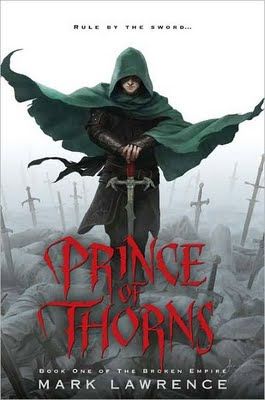Book Review: Prince of Thorns

This book (which has an AWESOME cover) starts out quite promising and engrossing, then grows a bit disturbing and annoying. It ends before it can redeem itself.
The first page introduces a battlefield charmingly:
Ravens! Always the ravens.
Well done; I was hooked. But it wasn't long before credulity got strained to the max. Prince Honorous Jorg Ancrath isn't just your typical tramautized princeling with a dark past and an even darker future. This barely fourteen-year-old is also a leader of a band of cutthroats. Ahem? Sure, a lust for power often drives men of all ages into leadership roles--but seriously, a kid bossing around a bunch of tough cookies bigger and badder than he is? That's a stretch, even if he's over six feet tall and bent on a mission of revenge.
Also, I read the book cover to cover, and I still can't figure out if Honorous is just another title for the prince, or if his real first name is Honorous. Maybe I missed something somewhere?
To be fair, Jorg is a very compelling character. He has a tenacity just snarky enough make you like him, even while you are always wondering WHY this kid hadn't dunced himself to death yet. (Is dunced a word? If not, I call dibs for first use!) For every flash of brilliance Jorg gets, he seems to pull two or three royal face-plants. His well-drawn characterization, as well as a couple other characters, is what kept me turning pages--even when I became less and less impressed with a band that didn't seem to mind pillaging, killing, and raping their way through undefended villages. The reign of terror wanes against innocents as the book goes on, but still, that thorn festers. Resolution is needed there.
At the last minute, Jorg's secret, which even he doesn't know, is finally revealed. [Spoilers]He's been a puppet in the hands of a master sorcerer. His ability to hold sway over men (and even spirits); his lust for blood and power and revenge; his crazy mood swings; everything he is owes itself to the sorcerer's manipulative powers. The reason is good, and made everything I mentally complained about make sense. But that understanding came too late. The balance of foreshadowing and keeping the reader in the dark needed work. If we readers are in for a big surprise that answers all our questions at the end, we need more indicators to lend credibility early on. Otherwise we are rolling our eyes. I sure rolled my eyes a lot.
But I wouldn't mind that very much if Jorg had shown more remorse about all the bad things he had done, or had allowed his men to do. Especially the killing and raping. At the end, he makes a resolution to abstain from that in future--but then he blatantly refuses to apologize for past wrongs. Um, what? Doing better in future is nice, but not enough--not if you don't show proper regret and sorrow for what you did in the past. What's the point of mending your ways if you don't feel repentance first? A casual hey, that wasn't quite so cool after all, let's lay off that isn't acceptable. If a guy hurts people that badly, and he's supposed the hero, he needs to be extremely upset about it. A bundle of messed-up angst.
Then maybe, just maybe, readers will forgive him. But without that penitence, readers are going to feel angry, because they came to care about a character that disappointed them. That's how I felt.
Maybe a hero, or even a dark hero, wasn't what Mark Lawrence was aiming to paint. Maybe Jorg was meant to be an anti-hero in a protagonist's role all along. That's the only way I can make any sense of the ending--and still, I'm not fully satisfied. I think there are more books on the way--if so, I sure hope Jorg shows repentance in a sequel.